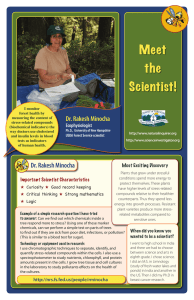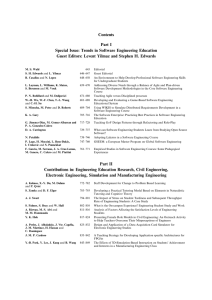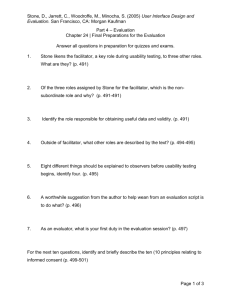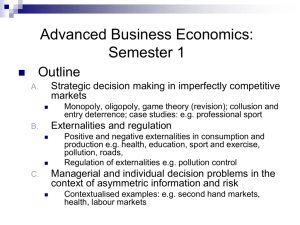Stephanie Lyn Long
advertisement
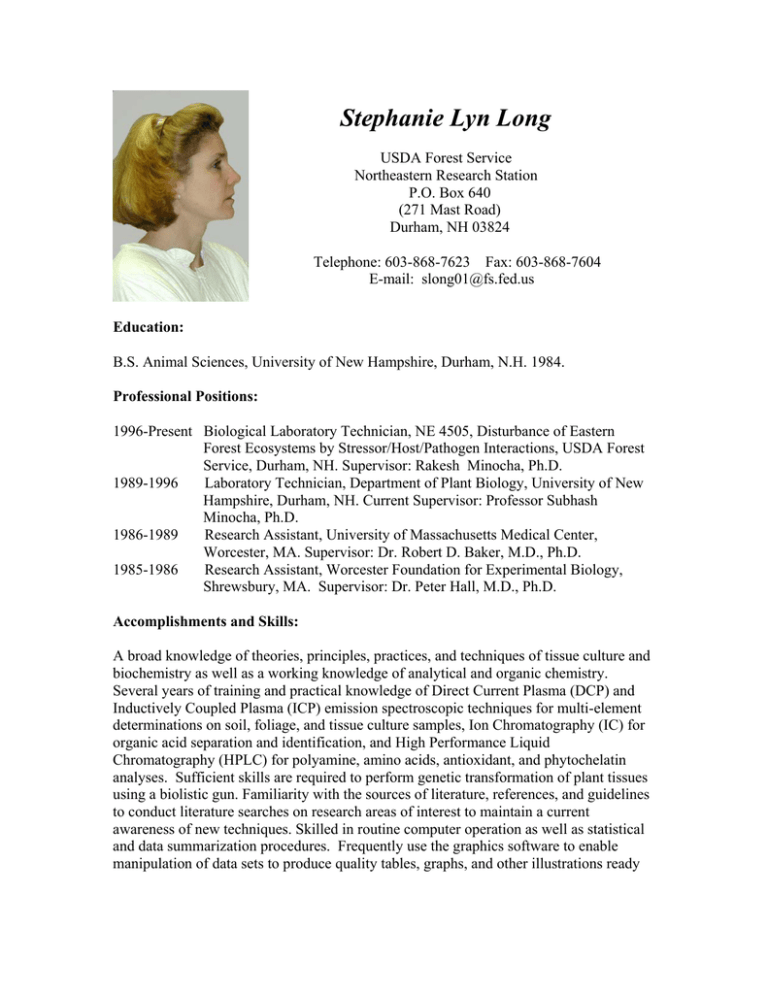
Stephanie Lyn Long USDA Forest Service Northeastern Research Station P.O. Box 640 (271 Mast Road) Durham, NH 03824 Telephone: 603-868-7623 Fax: 603-868-7604 E-mail: slong01@fs.fed.us Education: B.S. Animal Sciences, University of New Hampshire, Durham, N.H. 1984. Professional Positions: 1996-Present Biological Laboratory Technician, NE 4505, Disturbance of Eastern Forest Ecosystems by Stressor/Host/Pathogen Interactions, USDA Forest Service, Durham, NH. Supervisor: Rakesh Minocha, Ph.D. 1989-1996 Laboratory Technician, Department of Plant Biology, University of New Hampshire, Durham, NH. Current Supervisor: Professor Subhash Minocha, Ph.D. 1986-1989 Research Assistant, University of Massachusetts Medical Center, Worcester, MA. Supervisor: Dr. Robert D. Baker, M.D., Ph.D. 1985-1986 Research Assistant, Worcester Foundation for Experimental Biology, Shrewsbury, MA. Supervisor: Dr. Peter Hall, M.D., Ph.D. Accomplishments and Skills: A broad knowledge of theories, principles, practices, and techniques of tissue culture and biochemistry as well as a working knowledge of analytical and organic chemistry. Several years of training and practical knowledge of Direct Current Plasma (DCP) and Inductively Coupled Plasma (ICP) emission spectroscopic techniques for multi-element determinations on soil, foliage, and tissue culture samples, Ion Chromatography (IC) for organic acid separation and identification, and High Performance Liquid Chromatography (HPLC) for polyamine, amino acids, antioxidant, and phytochelatin analyses. Sufficient skills are required to perform genetic transformation of plant tissues using a biolistic gun. Familiarity with the sources of literature, references, and guidelines to conduct literature searches on research areas of interest to maintain a current awareness of new techniques. Skilled in routine computer operation as well as statistical and data summarization procedures. Frequently use the graphics software to enable manipulation of data sets to produce quality tables, graphs, and other illustrations ready for publication or for presentation at meetings. Assist in editing co-authored peerreviewed manuscripts as well as material and methods section of reports and work plans. Frequently update regulations on normal laboratory safety, radiation safety, and first-aid procedures as well as specific precautions needed in using hazardous chemicals. Training Courses: Waters Corporation Applied HPLC Technology Seminar, November 1994. Fisons Instruments Plasma Applications Training School, December 1994. Techniques of ICP-AES@ training course offered by Varian Corp. February 1999. Understanding the Principles for Reliable Integration by Wilhad M. Router, Al Barckhoff and Lee Marotta. Perkin Elmer, Online Training in HPLC. September 19, 2002. Acrobat 5.0, Level 1. Eight hour computer training course in the use of Adobe Acrobat program. November 11, 2003. Selected Publications: 1. Minocha R, Long S, Magill AH, Aber J and McDowell WH. 2000. Foliar free polyamine and inorganic ion content in relation to soil and soil solution chemistry in two fertilized forest stands at the Harvard Forest, Massachusetts. Plant Soil. 222:119-137. 2. Bhatnagar P, Glasheen BM, Bains SK, Long SL, Minocha R, Walter C and Minocha SC. 2001. Transgenic manipulation of the metabolism of polyamines in Poplar (Populus nigra x maximoviczii) cells. Plant Physiol. 125: 2139-2153. 3. Minocha R, McQuattie C, Fagerberg W, Long S and Woon Noh E. 2001. Effects of aluminum in red spruce (Picea rubens) cell cultures: Cell growth and viability, mitochondrial activity, ultrastructure and potential sites of intracellular aluminum accumulation. Physiol. Plant. 113:486-498. 4. Minocha R, Minocha SC and Long S. 2003. Monitoring environmental stress in forest trees using biochemical and physiological markers. In Sustainable Forestry, Wood Products, and Biotechnology. Espinel S, Barredo Y and Ritter E (eds.), DFA-AFA Press, Victoria-Gasteiz, Spain. p.109-116. 5. Minocha SC, Bhatnagar P, Minocha R and Long S. 2003. Genetic manipulation of polyamine metabolism in poplar. In Sustainable Forestry, Wood Products, and Biotechnology, Espinel S, Barredo Y and Ritter E (eds.), DFA-AFA Press, Victoria-Gasteiz, Spain. p.179-194. 6. Minocha R and Long S. 2004. Effects of aluminum on organic acid metabolism and secretion by red spruce cell suspension cultures and the reversal of Al effects on growth and polyamine metabolism by exogenous organic acids. Tree Physiol. 24:55-64. 7. Minocha R, Lee JS, Long S, Bhatnagar P and Minocha SC. 2004. Physiological responses of wild type and putrescine-overproducing transgenic cells of poplar to variations in the form and concentration of nitrogen in the medium. Tree Physiol. 24:551-560. 8. Bauer GA, Bazzaz FA, Minocha R, Long S, Magill A, Aber J and Berntson GM. 2004. Effects of chronic N additions on tissue chemistry, photosynthetic capacity, and carbon sequestration potential of a red pine (Pinus resinosa Ait.) stand in the NE United States. For. Ecol. Manage. 196:173-186. 9. Minocha R and Long S. 2004. Simultaneous separation and quantitation of amino acids and polyamines of forest tree tissues and cell cultures within a single high-performance liquid chromatography run using dansyl derivatization. J. Chromatogr. A. 1035 (1): 6373. 10. Minocha R, Minocha SC and Long S. 2004. Polyamines and their biosynthetic enzymes during somatic embryo development in red spruce (Picea rubens Sarg.). In vitro Cell. Dev. Biol. 40:572-580.
